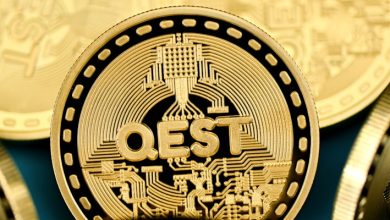The Future of Gaming: Play-to-Earn and NFTs

- Exploring the intersection of gaming and blockchain technology
- How Play-to-Earn is revolutionizing the gaming industry
- The rise of NFTs in the gaming world
- Understanding the economics behind Play-to-Earn games
- Challenges and opportunities in the future of gaming with NFTs
- The potential impact of Play-to-Earn on traditional gaming models
Exploring the intersection of gaming and blockchain technology
The intersection of gaming and blockchain technology is an exciting frontier that is revolutionizing the gaming industry. By leveraging blockchain technology, game developers can create unique play-to-earn models that allow players to monetize their gaming skills. This new paradigm shift is empowering gamers to not only enjoy playing their favorite games but also earn real-world value in the form of cryptocurrencies or non-fungible tokens (NFTs).
Blockchain technology enables secure and transparent transactions, ensuring that in-game assets and rewards are verifiable and cannot be duplicated or manipulated. This level of trust and authenticity is crucial in the gaming world, where virtual assets hold real value for players. NFTs, in particular, have gained popularity as a way to tokenize in-game items, skins, or characters, allowing players to buy, sell, and trade them on various digital marketplaces.
Moreover, blockchain technology also enables decentralized gaming platforms, where players have more control over their gaming experience and ownership of their in-game assets. This decentralized approach eliminates the need for intermediaries or centralized authorities, giving players more autonomy and sovereignty over their gaming assets. As a result, players can enjoy a more immersive and rewarding gaming experience while participating in a vibrant and decentralized gaming economy.
Overall, the integration of blockchain technology into the gaming industry is opening up new possibilities for players, developers, and investors alike. The play-to-earn model, coupled with the use of NFTs, is transforming how we perceive and interact with games, turning them into lucrative and engaging experiences. As the gaming industry continues to evolve, the intersection of gaming and blockchain technology will undoubtedly play a significant role in shaping the future of gaming for years to come.
How Play-to-Earn is revolutionizing the gaming industry
Play-to-Earn is a groundbreaking concept that is transforming the gaming industry as we know it. This innovative approach allows players to earn real money or valuable in-game assets by participating in gameplay and completing various tasks within the game. The emergence of blockchain technology has made this possible by enabling the creation of non-fungible tokens (NFTs) that represent unique in-game items or characters.
One of the key benefits of Play-to-Earn is that it provides players with a new way to monetize their gaming skills and time investment. Instead of just playing for entertainment, gamers can now earn a tangible reward for their efforts. This has the potential to attract a wider audience to gaming, including those who may not have been interested before due to the lack of financial incentives.
Moreover, Play-to-Earn introduces a level of transparency and fairness to the gaming ecosystem. Since blockchain technology ensures that transactions are secure and immutable, players can trust that the rewards they earn are legitimate and cannot be tampered with. This helps to build a sense of trust and credibility within the gaming community, fostering a more positive and engaging environment for all participants.
The rise of NFTs in the gaming world
NFTs, or non-fungible tokens, have been making waves in the gaming world recently. These unique digital assets are revolutionizing the way players can buy, sell, and trade in-game items. By using blockchain technology, NFTs provide players with true ownership of their virtual belongings, allowing them to transfer or sell them outside of the game. This opens up a whole new world of possibilities for gamers to monetize their gaming experience.
Understanding the economics behind Play-to-Earn games
Understanding the economics behind Play-to-Earn games is crucial for anyone looking to delve into this emerging sector of the gaming industry. These games allow players to earn real money or valuable digital assets by participating in gameplay and completing various tasks. The economic model behind Play-to-Earn games is based on the principles of supply and demand, as well as the concept of scarcity.
In Play-to-Earn games, players can earn in-game tokens, NFTs, or other digital assets that have real-world value. These assets can be traded, sold, or used within the game ecosystem, creating a dynamic economy where players can profit from their time and skills. The value of these assets is determined by factors such as rarity, utility, and demand, making the economy of Play-to-Earn games a complex and ever-changing system.
Developers of Play-to-Earn games often use blockchain technology to ensure the security and transparency of in-game transactions. By utilizing smart contracts and decentralized ledgers, players can have full ownership of their in-game assets and trust that their transactions are secure and verifiable. This level of transparency and ownership is a key feature of Play-to-Earn games and sets them apart from traditional gaming models.
Challenges and opportunities in the future of gaming with NFTs
As the gaming industry continues to evolve, the integration of NFTs presents both challenges and opportunities for the future. One of the main challenges is the potential for increased competition and saturation in the market as more developers and players enter the space. This could lead to a dilution of quality and a lack of innovation in gameplay.
On the other hand, the introduction of NFTs also opens up new opportunities for gamers to truly own and monetize their in-game assets. This play-to-earn model empowers players to earn real-world income by participating in the virtual economy. It also provides a new level of transparency and security for digital ownership.
However, with these opportunities come new challenges, such as the need for increased security measures to protect against fraud and hacking. Additionally, the environmental impact of blockchain technology used in NFTs is a growing concern that will need to be addressed in the future.
Despite these challenges, the future of gaming with NFTs holds great promise for revolutionizing the industry and empowering players in ways never seen before. By addressing these challenges head-on and embracing the opportunities presented, developers and players alike can shape a new era of gaming that is more immersive, inclusive, and rewarding for all involved.
The potential impact of Play-to-Earn on traditional gaming models
The potential impact of Play-to-Earn on traditional gaming models is significant. As more players discover the benefits of earning real money while playing games, traditional gaming companies may need to adapt their business models to stay competitive. Play-to-Earn introduces a new dynamic where players are not only consumers but also active participants in the economy of the game.
One potential consequence of this shift is the democratization of gaming revenue. Instead of a few top players or companies capturing the majority of the profits, Play-to-Earn allows more players to earn money based on their skills and time investment in the game. This could lead to a more equitable distribution of wealth within the gaming community.
Furthermore, the introduction of NFTs in gaming through Play-to-Earn models could revolutionize the way in-game assets are bought, sold, and traded. NFTs provide players with true ownership of their digital assets, allowing them to transfer or sell them outside of the game environment. This opens up new possibilities for players to monetize their gaming experience in ways that were previously impossible.



